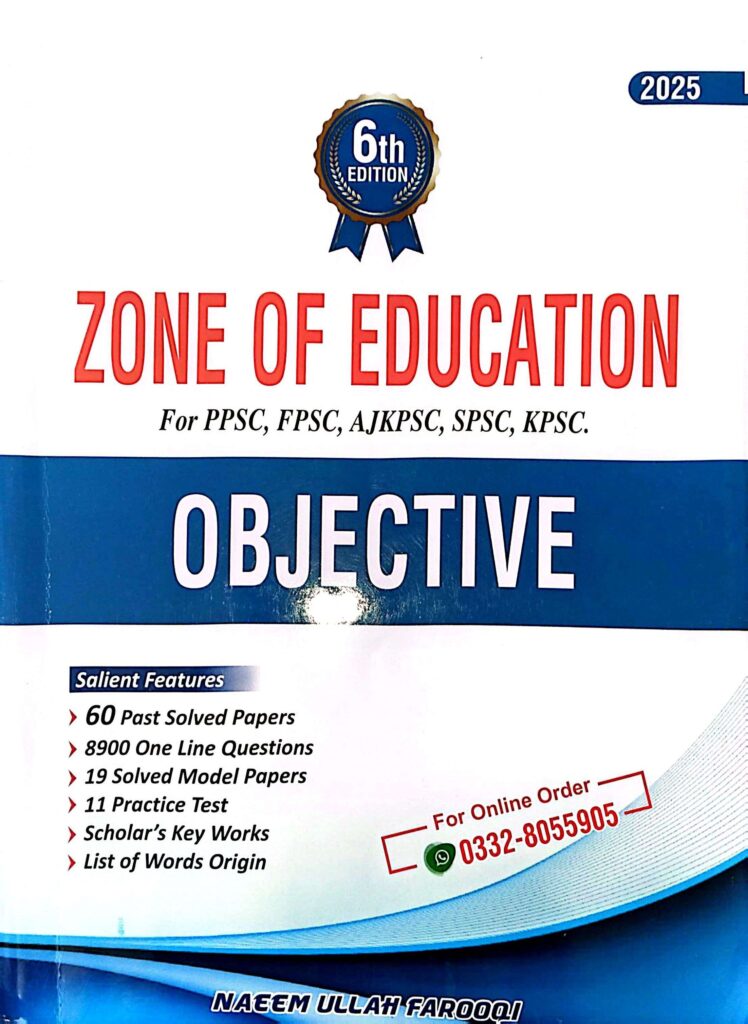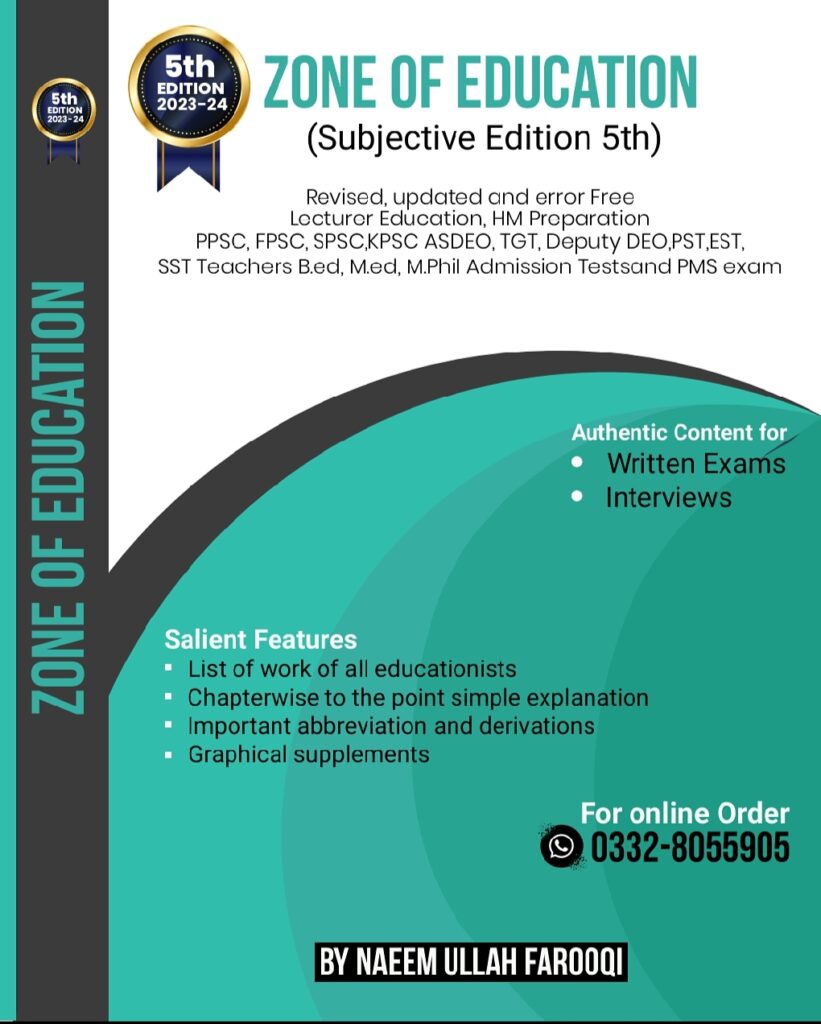Psychology
.Jean Piaget was not only a psychologist but also a:
· A. Sociologist
· B. Mathematician
· C. Epistemologist
· D. None of the above
Ans: (C) Epistemologist
143. Jean Piaget is a world-renowned psychologist for his explorations of the:
· A. Social development of children
· B. Emotional development of children
· C. Psychological development of children
· D. Cognitive development of children
Ans: (D) Cognitive development of children
144. According to Piaget, infants rely on their senses to understand the world around them in the:
· A. Occupational stage
· B. Sensorimotor stage
· C. Sensorial stage
· D. None of the above
Ans: (B) Sensorimotor stage
145. Pre-school children develop an increased capacity for language and symbolic thinking in the stage called by Piaget:
· A. Sensorimotor stage
· B. Operational stage
· C. Preoperational stage
· D. None of the above
Ans: (C) Preoperational stage
146. Children think logically and begin to see the world from others’ perspectives at the stage:
· A. Preoperational
· B. Occupational
· C. Concrete operational
· D. None of the above
Ans: (C) Concrete operational
147. Hypothetical and abstract reasoning with systematic problem-solving and abstract thinking starts at:
· A. Concrete operational stage
· B. Preoperational stage
· C. Formal operational stage
· D. None of the above
Ans: (C) Formal operational stage
148. In Piaget’s theory, the first two years of life are stages called the:
· A. Paralinguistic
· B. Exploratory
· C. Sensorimotor
· D. Preoperational
Ans: (C) Sensorimotor
149. According to Piaget, the major accomplishment of the sensorimotor stage is:
· A. Abstract thinking
· B. Egocentrism
· C. Centration
· D. None of these
Ans: (B) Egocentrism
150. During the stage of concrete operations, children:
· A. Understand the concept of reversibility
· B. Do not yet understand the concept of conservation
· C. Are able to solve abstract problems
· D. None of these
Ans : A. Understand the concept of reversibility
·
151. Jean Piaget’s theory of cognitive development states that:
· A. Children are egocentric during the stage of preoperational thought
· B. Object permanence is developed during the stage of concrete operational thought
· C. As children proceed from the stage of preoperational thought to the stage of formal operations, they achieve a sense of conservation and reversibility
· D. Child development is largely culturally determined
Ans: (C) As children proceed from the stage of preoperational thought to the stage of formal operations, they achieve a sense of conservation and reversibility
152. B.F. Skinner (1904-1990) is considered by most to be one of the pivotal psychologists of the:
· A. Eighteenth century
· B. Nineteenth century
· C. Twentieth century
· D. Twenty-first century
Ans: (C) Twentieth century
153. Skinner was an American psychologist best known for the theory called:
· A. Classical conditioning
· B. Social conditioning
· C. Formal conditioning
· D. Operant conditioning
Ans: (D) Operant conditioning
154. Operant conditioning states that learning occurs as a result of the _______ the subject receives in response to a particular behavior:
· A. Rewards only
· B. Punishment only
· C. Rewards and punishments
· D. None of the above
Ans: (C) Rewards and punishments
155. According to John Dewey, the teacher should guide students in the way of knowledge as a _______ in the learning process:
· A. Facilitator
· B. Guider
· C. Philosopher
· D. Partner
Ans: (D) Partner
156. Which educator gave the idea of Behaviorism in the education system?
· A. John Locke
· B. Thorndike
· C. Herbert Spencer
· D. Watson
Ans: (D) Watson
157. At the beginning of the nineteenth century, whose focus was the study of the development of the mind?
· A. Jean Piaget
· B. William James
· C. Hill Gard
· D. William Stern
Ans: (A) Jean Piaget
158. Who had devised the term IQ (Intelligence Quotient)?
· A. William James
· B. William Stern
· C. John Locke
· D. John Dewey
Ans: (B) William Stern
159. Bert called the intelligence to:
· A. Nature
· B. Genes
· C. Innate
· D. Health
Ans: (C) Innate
160. Which educator presented “Law of Readiness, Law of Exercise, and Law of Effect”?
· A. Hill Gard
· B. Thorndike
· C. Spencer
· D. Rousseau
Ans: (B) Thorndike
161. Who said that “These situations are mental evolutions that are aspects of conflict and anxiety”?
· A. Hill Gard
· B. Watson
· C. Jean Piaget
· D. Ralph Tyler
Ans: (D) Ralph Tyler
162. The development of skills and knowledge of a child starts at:
· A. Home
· B. Library
· C. Mosque
· D. Park
Ans: (A) Home
163. Who are usually responsible for conducting classroom and laboratory learning studies which are carefully planned?
· A. School’s Principal
· B. District Education Officer
· C. Psychologists of Education
· D. School Teachers
Ans: (C) Psychologists of Education
164. During the 19th century, European psychologists devoted their best attention to studies dealing with:
· A. Mental imagery
· B. Physical imagery
· C. Individual imagery
· D. Social imagery
Ans: (A) Mental imagery
165. Which psychologists introduced the application of scientifically evolved principles and theories of learning in the education system?
· A. Chinese
· B. American
· C. German
· D. British
Ans: (B) American
166. Psychological experiments are used to test concerning human:
· A. Nature
· B. Behavior
· C. Emotions
· D. Intelligence
Ans: (B) Behavior
1. IED stands for:
o A. Inclusive Education Department
o B. Institute of Educational Development
o C. International Educational Design
o D. Integrated Educational Discipline
o Ans: (B) Institute of Educational Development
2. WING stands for:
o A. Women In Governance
o B. Working in National Group
o C. Women’s Independent National Guild
o D. Women Inclusion Network Group
o Ans: (B) Working in National Group
3. Dogar’s Testmaster is related to:
o A. Academic exams
o B. Competitive exams
o C. Skill development
o D. Job preparation
o Ans: (B) Competitive exams
4. The main focus of C. Education is:
o A. Child Education
o B. Civic Education
o C. Comparative Education
o D. Curriculum Education
o Ans: (B) Civic Education
5. Educational psychology nowadays emphasizes the value of satisfaction in:
o A. Learning
o B. Education
o C. Management
o D. Environment
o Ans: (A) Learning
6. A teacher should have an intelligence quotient (IQ) of at least:
o A. 120
o B. 125
o C. 130
o D. 135
o Ans: (A) 120
7. A nervous or shy child cannot obtain the benefit from his:
o A. Personal experiences
o B. Learning experiences
o C. Social experiences
o D. None of these
o Ans: (B) Learning experiences
8. Learning to read is a complex:
o A. Procedure
o B. Phenomenon
o C. Activity
o D. Behavior
o Ans: (C) Activity
9. The obtaining of thought from written material can be possible through silent:
o A. Reading
o B. Planning
o C. Practice
o D. Learning
o Ans: (A) Reading
10. A successful practice in education is to take a test of:
o A. Teacher
o B. Principal
o C. Learning
o D. Evaluation
o Ans: (C) Learning
JOIN ZONE OF EDUCATIONPK!
Discover the most comprehensive and reliable pedagogy resources in Pakistan, curated for competitive exam success. Our content covers all competitive exam MCQs, including PPSC, FPSC, AJKPSC, SPSC, and more. Designed to empower learners with top-notch material and insights, trust us for your preparation journey!


